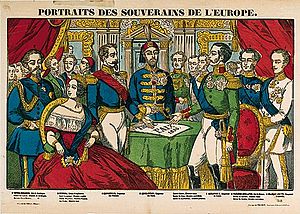Congress of Paris (1856)
The Congress of Paris was an 1856 diplomatic meeting held in Paris, France,[1] between representatives of the great powers in Europe to make peace almost three years after the Crimean War had started.
The Congress was attended by diplomatic representatives from the nations of France, Great Britain, Russia, Austria, and Prussia, as well as from the Ottoman Empire and Sardinia-Piedmont. The agreement resulted in continued recognition of the Ottoman Empire and the return to pre-war territorial borders for Russia and the Empire.
Background
The Crimean War was fought mainly on the Crimean Peninsula by Russia on one side and Great Britain, France, the Ottoman Empire and Sardinia-Piedmont on the other side for two main reasons.
One reason was the Russians' demand for both better treatment of and their right to protect the Ottoman Empire's Orthodox subjects.[2] That would be promised by the sultan at the Congress of Paris.
Another reason was a dispute between the Russians and the French about the privileges of the Russian Orthodox and the Roman Catholic Churches in Palestine.[2]
Backed by Britain and France, the sultan declared war against Russia on 4 October 1853.[2] On 28 March 1854, both of the other powers declared war against Russia.
On 26 January 1855, Sardinia-Piedmont also entered the war by sending 10,000 troops to aid the allies against Russia.[2]
Throughout the war, the Russian Army's main concern was to make sure that the Austrian Empire stayed out of the war. Its threats to enter the war ended the war.
Congress

The great powers in Europe were France, Great Britain, Russia, Austria, and Prussia. Also at the Congress were representatives of the Ottoman Empire and Sardinia-Piedmont.[1][3] They assembled soon after 1 February 1856, when Russia accepted the first set of peace terms after Austria threatened to enter the war. It is also notable that the meeting took place in Paris, at the conclusion of the 1855 Exposition Universelle[2]
The Congress of Paris worked out the final terms from 25 February to 30 March 1856, when the Treaty of Paris was signed on 30 March 1856 with Russia on one side and France, Great Britain, Ottoman Turkey and Sardinia-Piedmont on the other.[1] at the Quai d'Orsay.[4]
One of the representatives who attended the Congress of Paris on behalf of the Ottoman Empire was Mehmed Emin Âli Pasha, who was the Ottoman Empire's grand vizier.[4] Russia was represented by Prince Orlov and Baron Brunnov. Britain sent Lord Cowley, its ambassador to France.
Although other congresses, such as the Congress of Vienna (1814), spread questions and issues for different committees to resolve, the Congress of Paris resolved everything at the same time.[5]
A significant diplomatic victory was scored by tiny Sardinia-Piedmont although it was not yet considered a European great power by being granted a seat by French Emperor Napoleon III, mostly for having sent an expeditionary corps of 18,000 men to fight against Russia, but also possibly because of the intrigues of the very attractive Countess of Castiglione, who had caught his attention. Foreign minister Camillo Benso di Cavour seized the opportunity to denounce Austrian political and military interference in the Italian Peninsula, which he said was stifling the wish of Italians to choose their government.
Agreement

The Congress resulted in a pledge by all powers to jointly maintain "the integrity of the Ottoman Empire", thus guaranteeing its independence.[1]
Also, Russia gave up the left bank of the mouth of the Danube River, including part of Bessarabia,[3] to Moldavia, as well as its claim to the special protection of Christians in the Ottoman Empire. Moldavia and Wallachia, which together would become Romania in 1858, along with Serbia, were recognized as quasi-independent self-governing principalities under protection of the other European powers. The Ottoman sultan agreed, in return, to help to improve the status of the Christian subjects in his empire.[3]
The territories of Russia and the Ottoman Empire were restored to their prewar boundaries.[3] The Black Sea was neutralized and so that no warships were allowed to enter, but it was open to all other nations.[3] It also opened the Danube River for shipping from all nations.[1]
Aftermath
Turkish historians still express dissatisfaction: "Although [the] Ottoman Empire was on the side of victors, the Porte also lost the right to have a navy in the Black Sea together with the Russia. Put differently, the Empire had become a part of the European Concert, but not an actor in the European balance of power. Thus it was not recognized as a great power that could claim compensation in case of territorial gain by another member of the system".[6]
The conditions of the Paris Congress collapsed after the defeat of France in the 1870-1871 French-Prussian War. After the surrender of the fortress of Metz, when France lost hope of winning the war, Russia announced its refusal to comply with the terms of the treaty. Russian Foreign Minister Alexander Gorchakov denounced the treaty's Black Sea clauses on October 31, 1870, which was documented by the 1871 Treaty of London.
Some of the rules and agreements would be changed by the Congress of Berlin.[3]
References
R.R. Palmer, Joel Colton, Lloyd Kramer (2002). A History of the Modern World since 1815. McGraw Hill. ISBN 0-07-250280-0.{{cite book}}: CS1 maint: multiple names: authors list (link)
- ^ a b c d e "Paris, Treaty of (1856)". The New Encyclopædia Britannica. Encyclopædia Britannica Inc. Volume 9. 15th ed. pp. 153-154. 2007.
- ^ a b c d e The Crimean War 1853- 1856. http://www.onwar.com/aced/data/cite/crimean1853.htm Archived 25 May 2011 at the Wayback Machine. 2008.
- ^ a b c d e f "Congress of Paris". The Columbia Encyclopedia, Sixth Edition. http://www.encyclopedia.com/doc/1E1-Paris-Co.html. 2008
- ^ a b Barchard, David. SETTING THE WORLD TO RIGHTS. http://www.cornucopia.net/highlights35.html. 2008
- ^ Phillips, Walter Alison (1911). . In Chisholm, Hugh (ed.). Encyclopædia Britannica. Vol. 6 (11th ed.). Cambridge University Press. p. 938.
- ^ Candan Badem, The Ottoman Crimean War (1853-1856). Leiden-Boston.1970.p.403
